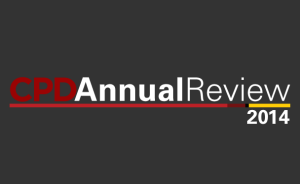Appendices & Acknowledgments
Appendix 1 – Methodology
PD News Analysis
CPD aggregates news stories and commentary about public diplomacy activities around the world in its PD News section on a daily basis. In 2014, CPD’s aggregation of 2,233 stories derived from 597 news outlets and blogs that covered public diplomacy topics in the English language alone. We recognize that limiting coverage to English-language news sources is an imperfect gauge for the full scope of public diplomacy activities; however, we expect that as CPD’s resources improve, we will be able to remedy this in due course. Until then, we are proud to say that the CPD Annual Review remains the most comprehensive analysis of PD News available.
In order to prepare for the 2014 CPD Annual Review, the Center determined the year’s most relevant public diplomacy topics by establishing 12 categories under which we could define different types of public diplomacy activities. Each PD News story was collected and categorized under at least one of these topics (see Figure 3) and coded based on the countries involved in the public diplomacy efforts, either as initiators or recipients. Keywords were assigned to each story to clearly define the scope of the activity. Lastly, stories considered particularly important were highlighted for special consideration. Because there is often significant overlap between categories (for example, a story might touch on both Soft Power and International Broadcasting), we tried to highlight the two most important components of each story and classify it under those categories.
The data collected in 2014 were analyzed and visualized using various software programs such as Microsoft Office, JMP from SAS, and other tools, allowing CPD to identify the most utilized public diplomacy tools, most mentioned countries in PD News, top PD actors, and trending topics in 2014.
Selection of Top Ten Stories
CPD used all stories aggregated in 2014 to identify the top ten public diplomacy events from around the world. To make this selection, we convened a panel of international experts and asked each to choose the most significant PD stories of 2014 from a list of 50. From the panelists’ choices, we ranked the top stories based on the number of votes (quantitative), as well as comments about the global PD significance of the stories selected (qualitative).
To narrow our list of 2,233 stories to 50, we took into account the following factors: the frequency of the story’s coverage in various news sources, the implications of the public diplomacy event, the credibility of sources, and the frequency of an actor’s participation in public diplomacy activities. CPD staff then reviewed the stories to ensure that the full spectrum of PD content was represented across the broadest geographical regions and that they included various types of PD initiatives (cultural, governmental, non-state activities, etc.).
Appendix 2 – International Public Diplomacy Experts (by region of origin)
Australia
Caitlin Byrne, Assistant Professor
International Relations, Bond University
CPD Research Fellow 2010-12
Sweden
James Pamment, Post-doctoral fellow
University of Texas at Austin and Karlstad University
CPD Research Fellow 2013-15
South Korea
Jie-An Sohn, Former CEO and president
Arirang TV
Mexico
Jonathan Chait, Deputy General Director for North America
Ministry of Foreign Affairs of Mexico
CPD Summer Institute Alum, '12
Arturo Sarukhan, International Consultant
Mexican Ambassador to the United States (former)
CPD Distinguished Fellow
China
Anbin Shi, Professor
Media & Cultural Studies, Tsinghua University
Croatia
Jelena Perleta, Journalist & Editor
Croatian Television
CPD Summer Institute Alum, '12
India
Navdeep Suri, Indian Ambassador to Egypt
Indian Ministry of Foreign Affairs
CPD Summer Institute Alum, '10
Netherlands
Jan Melissen, Senior Research Fellow
Netherlands Institute of International Relations, Clingendael
United Kingdom
Nicholas J. Cull, Director and Professor
Master of Public Diplomacy Program, University of Southern California
United States
Robert Banks, Professor
Master of Public Diplomacy Program, University of Southern California
CPD Public Diplomat in Residence 2009-11
Carissa Gonzales, Foreign Service Officer
U.S. Department of State
CPD Summer Institute Alum, '14
Kathy Fitzpatrick, Professor and Associate Dean
Graduate Programs and Research, Florida International University
CPD Research Fellow 2009-11
Emily Metzgar, Associate Professor,
The Media School at Indiana University
CPD Summer Institute Alum, '09
Philip Seib, Vice Dean and Professor
Annenberg School for Communication and Journalism, University of Southern California
CPD Former Director
R.S. Zaharna, Associate Professor
American University
CPD Research Fellow, 2011-13
Appendix 3 – Identifying Top 10 Public Diplomacy Actors
To identify the top ten public diplomacy actors, we only took into account 1,365 stories (out of the total 2,233) in which there were a clear PD activity with a specific actor. News stories that had public diplomacy implications but did not have a specific actor were taken out of the running. It is important to note that in many instances the European Union and the United Nations were considered primary actors in public diplomacy. This may account for the absence of European countries in the list of top ten actors.
The majority of the coverage came from traditional print and broadcast media. A fraction came from single-subject, web-only media and government websites.
Acknowledgments
Special thanks to our international public diplomacy experts for taking the time to select their top stories and share their comments. CPD would like to acknowledge the work of Sohaela Amiri, Associate Editor of CPD Monitor and CPD Research Coordinator in methodically analyzing data and preparing this report. Additional thanks to CPD’s PD News Contributing Researchers (Colin Hale, Alina Evans, Rachel Inlender, Maria Portela and Rachele Honcharik) for expertly managing our daily aggregation of PD News over 2014 and to Sherine Badawi Walton and Lauren Lee White for their review and edits.
Issue Contents
Most Read CPD Blogs
-
January 29
-
January 20
-
December 17
-
January 28
-
January 2
Visit CPD's Online Library
Explore CPD's vast online database featuring the latest books, articles, speeches and information on international organizations dedicated to public diplomacy.









Add comment